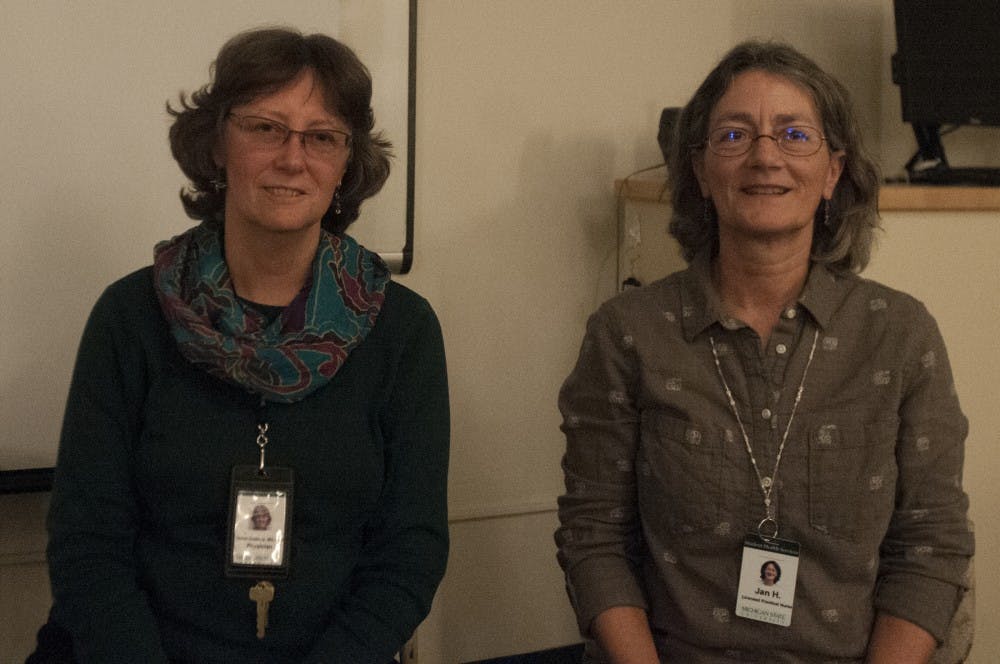The State of Relaxation at Olin Health Center provided KORU Mindfulness and Meditation classes this month to the MSU community.
KORU Mindfulness is a four-week, $75 program.
The meditation process helps teach students how to manage stress and mindfulness.
Dr. Debra Duxbury started the program after she attended a Harvard Continuing Medical Education conference in 2009. She was looking at ways to bring meditation to the MSU community.
“I found out about KORU, which was tailored to the aging adult, which is 17 years old to the 27 year old,” Duxbury said. “I approached my boss about bringing it in here, but because we are (a) very busy clinic, it took quite awhile to bring it here.”
Duxbury started a company in the community to teach KORU Mindfulness until she was able to teach the program, with her first class having been taught with LPN Jan Hettich in March 2015.
“After I took her class in the mindfulness, part is just to keep mindfulness, meaning you live in the moment that you are,” Hettich said. “To bring that awareness to people in college while they’re studying is helpful for them to de-stress and to focus and think better of themselves.”
All of the KORU Mindfulness techniques taught in their class are geared toward being less judgmental of oneself and living right in the moment, Duxbury said.
“I see a lot of suffering in the patients and I really wanted to increase their people in general,” Duxbury said. “Since I am on a college campus, I wanted to increase the flourishing and the resiliency and to try and implement greater retention rates of the students.”
By using KORU Mindfulness meditation to help find inner peace with one’s mind and body, Duxbury and Hettich wanted to create healthier ways to relieve stress in young adults, without resorting to prescription drugs.
“I feel that physicians really need to be modeling what we can do with the wisdom of our bodies,” Duxbury said. “The way healthcare is structured, it can unfortunately seem that we just dispense meds. ... But you can’t leave your skills at home. You can forget your medication bottle.”
Duxbury said she feels there is a lot of inefficiency in the workplace, academic environment and life in general when people don’t have the capacity to wear the stresses of life.
“We need to learn how to surf it, rather than tumbling through the waves and just splattering in the sand again,” Duxbury said. “That’s what I wanted to do and to increase that resiliency and capacity to appreciate things in life.”
Studies in mindfulness are shown to be just as affective as medication and treating mild to moderate depression and preventing recurrence rates, Duxbury said.
Holly Rogers and Margaret Maytan, Duke University psychiatrists and developers of the KORU Mindfulness program, inspired Duxbury to share their ideas and ways of meditating, she said.
“When they did the studies of KORU, it had moderate to significant effect sizes on self compassion, living mindfully, improved sleep, and being less self judgmental,” Duxbury said. “Teaching a variety of meditations and life skills that people can take out into life, so that is how we structure it.”
The word KORU came from a trip to New Zealand where Rogers went to work in community mental health after her psychology residency, Duxbury said.
“What that means is fern tip, but it’s a metaphor for the emerging adult,” Duxbury said. “It’s an individualization process when you think of the life span. They’re trying to find a stable authentic self in the face of change.”
Each class, Hettich and Duxbury go over two new skills for students to practice during the week until they meet the following week.
“Each class there is two skills, so they can kind of pick which one fits for them,” Hettich said. “One could work really well for one person and not very well for another, so it sort of helps people realize that everyone is different and how they will learn to focus and be mindful might be different.”






